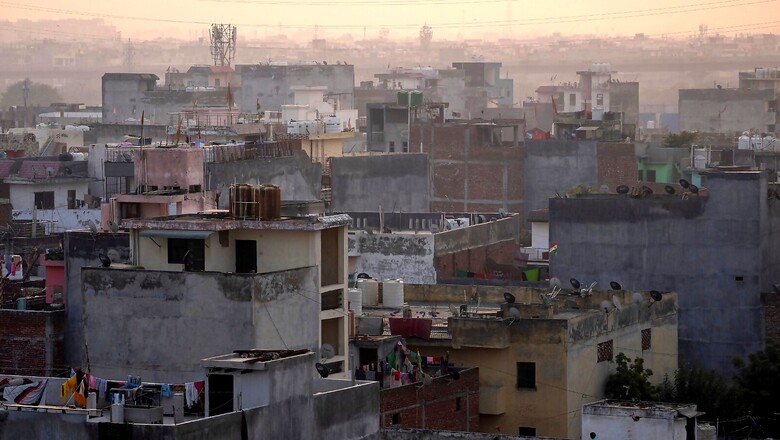
views
As Delhi’s air quality turned “very poor” on Tuesday, a day after Diwali, Chief Minister Arvind Kejriwal would have ideally launched a Twitter attack against the Punjab government. But not this time.
The Delhi government, instead, has lauded the people of Delhi for making it a “cleaner Diwali” this time. And as Punjab is witnessing a large number of farm fire incidents, it has instead trained its gun on the central government for its “blunt refusal to provide a cash incentive to farmers in Punjab for not burning crop residue” which, according to Delhi Environment Minister Gopal Rai, “has impacted the campaign against stubble burning in the agrarian state”.
Delhi Versus Punjab
Arvind Kejriwal on Tuesday tweeted, “Some years back, Del was the most polluted city in the world. Not any more! People of Del worked v hard. Today, we hv improved a lot. Whereas we hv improved, its still a long way. We will continue working hard so that we find a place in the best cities of the world.”
Some years back, Del was the most polluted city in the world. Not any more!People of Del worked v hard. Today, we hv improved a lot. Whereas we hv improved, its still a long way. We will continue working hard so that we find a place in the best cities of the world. https://t.co/UTL18dEWP7
— Arvind Kejriwal (@ArvindKejriwal) October 24, 2022
He added, “After my tweets today, some people asking -hv we won war against pollution n am I satisfied? Not at all. It is encouraging that we r no more world’s most polluting city. It encourages us that we r on right track. However, we hv to become world’s cleanest city. Thats our goal.”
The Delhi CM, however, did not talk about the rise of farm fires in Punjab. As per a PTI report, “Punjab has reported a nearly three-fold jump in farm fire incidents in the last nine days, with the total number of such cases reaching 2,625 so far this season. From September 15 till October 10 this year, the state witnessed 718 stubble-burning incidents. According to data from the Ludhiana-based Punjab Remote Sensing Centre, the state recorded 436 farm fire cases on Wednesday.”
No United Effort
The winter action plan to combat air pollution in the capital has already been announced by the Delhi government. An emergency action plan to reduce wintertime air pollution is the Graded Response Action Plan (GRAP), which is overseen by the central government and is also in place. The Environment Pollution (Prevention and Control) Authority (EPCA), which was established by the Supreme Court in 1998, originally developed the GRAP, which is what the Delhi government’s winter action plan adds to.
The Commission for Air Quality Management in the National Capital Region and Adjoining Areas, which is now in charge of overseeing the GRAP’s implementation, was established in 2020 after EPCA was disbanded by the Central government.
The winter action plan of the Delhi government is an ad-hoc one and the GRAP is on which Delhi has been depending for the past 24 years during the pollution. Now as AAP rules both Punjab and Delhi, there are ample opportunities for both state governments to come together and launch a united plan to combat air pollution. The farm fires of Punjab not only affect Delhi but also the entire of north India.
Nobody with common sense would anticipate a quick fix to the stubble-burning problem in Punjab. But the citizens of Delhi have every right to anticipate some transparent politics from a political party that won power based on its anti-corruption efforts, and that had been regularly raising the pollution issue in the past.
Bio-decomposer Hype
If the AAP leaders are questioned about how Punjab and Delhi are working together to combat air pollution, they will mention the initiative of using Pusa bio-decomposer. The Delhi government used this strategy in 2019 and declared a resounding success. In 2020, the Delhi government argued that all states ought to use this strategy and urged the federal government to do the same.
This year, the governments of Delhi and Punjab joined forces and declared that they would implement this solution to stop stubble burning on 5,000 acres of farmland. The Punjab Pollution Control Board has reportedly noted that the results are not “very encouraging”. As a result, the single action that the governments of Delhi and Punjab jointly took was ineffective. The entire idea of using bio decomposers as a “Brahmastra” to stop stubble burning has faltered.
Sustainable, long-term plan
Air pollution is a serious health hazard. Every person living in this part of north India is suffering because of unchecked air pollution. Every political organisation should stand up and take concrete action to reduce pollution. In this fight against pollution, the role of the AAP has become quite significant, given the fact that it is currently in power in Punjab and Delhi.
The Punjab and Delhi governments can — and should — work together to develop long-term sustainable plans to stop stubble burning and reduce air pollution. There should be less reliance on impromptu pollution control measures. Making a sustainable, long-term plan should be a priority in the fight against pollution.
The author is a columnist and a PhD scholar in media and politics. He tweets @sayantan_gh. The views expressed in this article are those of the author and do not represent the stand of this publication.
Read all the Latest Opinions here




















Comments
0 comment